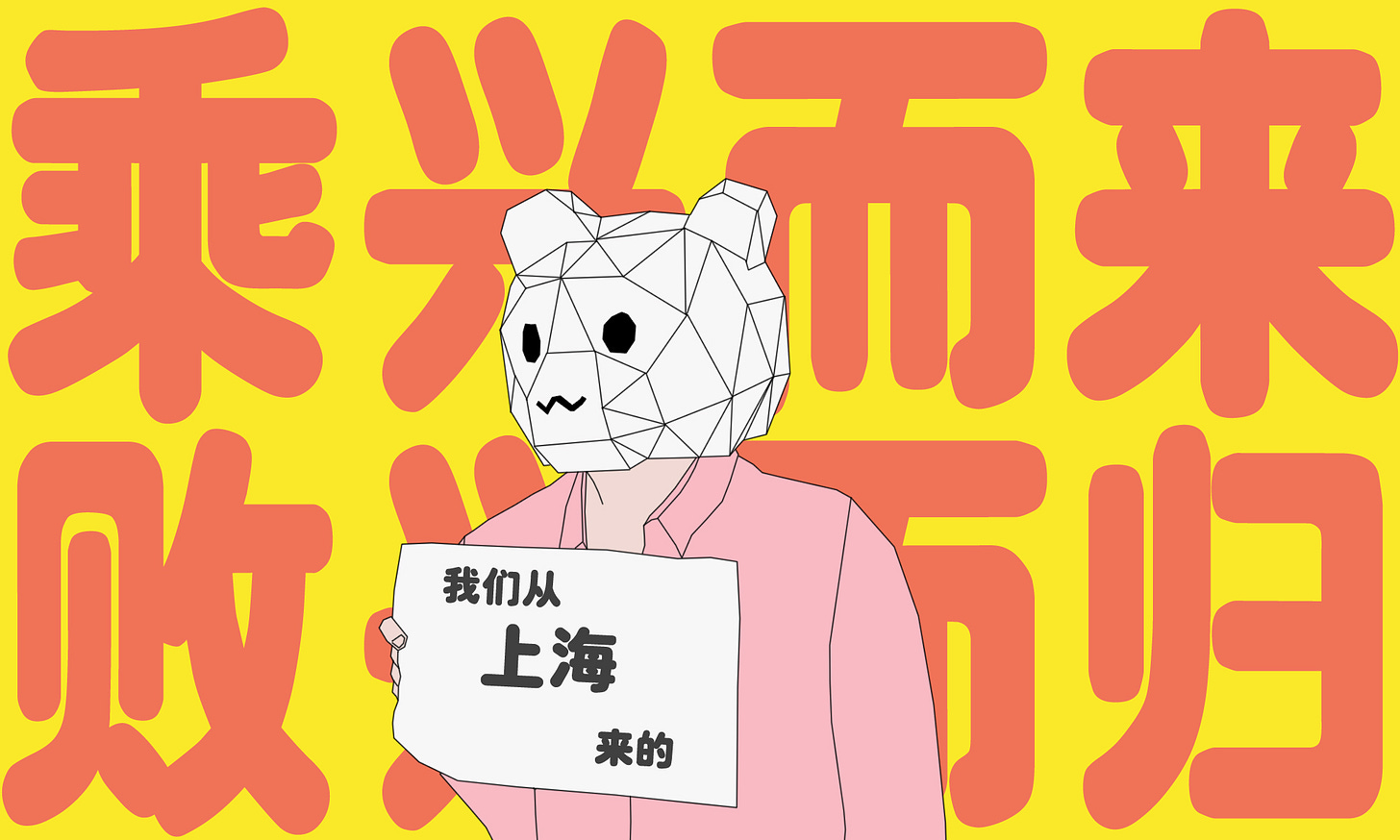"Arrive with excitement, leave in disappointment" — Phrase of the week
Much anticipated Halloween celebrations in Shanghai are cut short

Our phrase of the week is: "Arrive with excitement, leave in disappointment" 乘兴而来,败兴而归 (chéng xìng ér lái, bài xìng ér guī)
Context
Last year, Halloween in Shanghai took on a life of its own.
Renamed “All Memes Day” (万梗节), young people transformed this traditional Western celebration into a local showcase of creativity, satire, and social commentary.
The streets of Shanghai were a stage for imaginative cosplay, featuring costumes of celebrities like Austin Li (李佳琪) — who had faced public criticism earlier that year — to satirical takes on the tough graduate employment market, and the gruelling “996” work schedules in big tech companies.
Even full-body hazmat suits “dabai” (大白) made appearances, offering an ironic nod to the authorities’ zero-COVID policy which had abruptly ended earlier in 2023.
This year, as Halloween approached, news broke that Shanghai authorities would prohibit dabai costumes. Soon after that rumors circulated that all street cosplay would be banned.
On Saturday, October 26, the evening that celebrations were planned to take place, police announced increased patrols in popular areas for Halloween gatherings.
Despite the restrictions, young revelers adapted.
They shifted locations, but soon faced more crowd controls. And in the end, only Disneyland and Happy Valley theme parks, far from central Shanghai and requiring pricey entry fees, allowed costumes.
So, for most people celebrating Halloween on the streets of Shanghai this year, it ended in disappointment, as one Weibo user shared:
"I came to Shanghai’s Halloween with excitement but left in disappointment.
上海万圣节乘兴而来,败兴而去。
Shànghǎi wànshèngjié chéng xìng ér lái, bài xìng ér qù."
And with that, we have our Sinica Phrase of the Week!
What it means
The phrase “came with excitement but left in disappointment” (乘兴而来,败兴而归 chéng xìng ér lái, bài xìng ér guī) literally translates as "ride excitement on arrival" and "lose excitement on departure."
In some instances, the phrase’s final character, “return” (归 guī), is replaced by “leave” (去 qù), as seen in the social media post above. Both variations mean the same thing.
This expression first appeared in the 19th-century novel, The Three Heroes and Five Gallants (三侠五义 sān xiá wǔ yì), written in 1879 by the storyteller Shí Yùkūn 石玉昆. Performing in Beijing from 1810 to 1871, Shi attracted large crowds with his tales of the legendary Song dynasty official, Bāo Zhěng 包拯 (999 – 1062). His stories gained such popularity that by the late 1890s, publishing houses began circulating handwritten manuscripts, which grew into the novel The Three Heroes and Five Gallants.
Set in the 11th-century Song dynasty, the novel blends historical fiction with wuxia (martial arts) elements, chronicling the exploits of Bao Zheng and his loyal band of righteous heroes. These “three heroes” (三侠) and “five gallants” (五义) defend justice and protect the innocent, using their unique martial arts skills and bravery. Known for its captivating plot and memorable characters, the story had inspired over 20 adaptations by the 1920s and continues to influence Chinese opera, television, and film today.
Our phrase first appears in Chapter 7 of the novel:
Who would have thought he'd come with high spirits, only to leave disappointed, after searching for clues all day to no avail.
谁知乘兴而来,败兴而返,闹了一天并无机缘可寻。
Sheí zhī chéng xìng ér lái, bài xìng ér fǎn, nào le yì tiān bìng wú jīyuán kě xún.
This passage describes how Bao Zheng’s able assistant, Gōngsūn Cè 公孙策, traveled to a village to conduct a secret investigation. He was searching for evidence to confirm or refute witness statements, but after a full day of investigation, he left empty-handed, having found no useful clues.
In modern usage, the phrase captures the feeling of arriving with enthusiasm only to leave empty-handed or disheartened. This sentiment resonates with many Halloween revelers in Shanghai, whose celebrations last Saturday were unexpectedly canceled.
Andrew Methven is the author of RealTime Mandarin, a resource to help you learn contemporary Chinese in context, and stay on top of the latest language trends in China.
Read more about how this story is being discussed in the Chinese media in this week’s RealTime Mandarin.
Bonus Phrase: "All Memes Day" (万梗节), our Phrase of the Week from October last year when Shanghai Halloween celebrations drew national and international attention.


